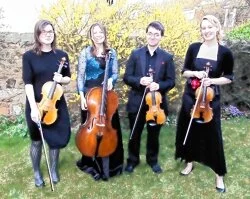'Adequate listening' in Starbucks
Originally published on http://www.culturewars.org.uk/
The Eris Quartet, Starbucks, Edinburgh, 3 August 2009
Edinburgh Festival Fringe 2009
I was slightly concerned when some friends of mine, recently graduated from music college and starting careers as professional chamber musicians, invited me to their debut Edinburgh Fringe concert – in Starbucks.
There is now a long-standing critique of ritualised, reverential listening to an imaginary museum of ‘classical’ concert repertoire, and the rift between musical ‘works’ and the social context which simultaneously produces, consumes and negotiates musical meanings. Certainly this will be a familiar trope to anyone who has participated in Institute of Ideas debates on music over the past few years. Indeed the idea of musical meaning not as transcendental, universal and wordless but rather as battled out in particular and diverse everyday contexts has been the key challenge of new musicology. Where many sociologists and cultural theorists have pointed the finger at the classical music establishment for attempting to shore up a fusty concert tradition and preserve a tiny elite listening public, Culture Wars has problematised the very role of the music critic.
Each year, as the doyens of Radio 3, the Proms or the Edinburgh International Festival celebrate the anniversary of one or other 18th century composer, a whole crew of faithful critics respectfully validate his (for its never a ‘her’) great works and their timeless meanings. A successful Beethoven is stirred with the pulse of revolution whereas the delicate harmonies of a Mozart reflect the perfect social harmony of an Enlightenment utopia. So how would tried and tested methods of music criticism and our transcendent works stand up to the ultimate disrespect of being designated background ambience in the cappuccino-serving supersymbol of commercial culture?
Taking a cue from popularising techniques of Classic FM and pop concerts, the Eris Quartet’s programme cuts and pastes movements from across eras – Dvorak cypresses are rudely interrupted by Stravinsky’s 3 pieces, quickly followed by a rarely performed quartet by the Earl of Kelly. Snippets of Borodin and Haydn are lush – it’s what the audience of coffee consumers is used to but in Technicolor. The more vibrant, warm tones and the face-to-face interaction between players allow us to follow the contours of the notes and feel like we’re in on all the in-jokes with the players and the music's long-dead creators. While blender zuzzes unhappily punctuate a cerebral commission by Charlie Usher and some of the lighter textures are lost underneath the coffee chatter, Sarah Spence’s resonant cello solo opening the Borodin evolves seamlessly upwards into the first violin, and the quartet display a unique togetherness that captivates an unexpectant audience.
Might we no longer be isolated dupes, subliminally directed to our third frapuccino by a creepily selected combo of thirst-inducing mediated muzak tracks? Or is this live performance simply promotion for a different arena of consumption? From chamber to concert stage and now instantaneously accessible recorded sonorous objects, the role of the live performance has had a radical reversal from ends to means – promotion of star ensembles or personalities and record sales.
So how can we reflect on the role of the critic in these circumstances? Musicologist Ola Stockfelt has developed the concept of ‘adequate listening’ to account for the different types of comprehensible context in which a work might be heard, and challenges the standard classical critic approach of ‘autonomous reflexive listening’ as the only way to ‘get’ music. But is there a role left at all for critics who adopt a position of methodological ‘philistinism’ – who no longer see their job as comparing performances to their ‘ideal’ scores? I hope that in continuing to experiment and question the role of music critics, Culture Wars can develop a space for engaging with musical performances which denies the intrinsic greatness of the classical canon whilst refusing to be reduced to small scale sociology.



